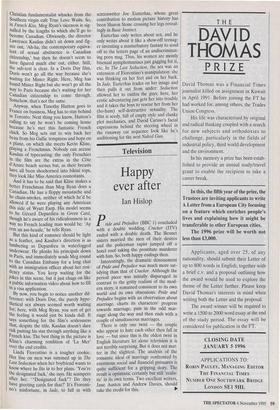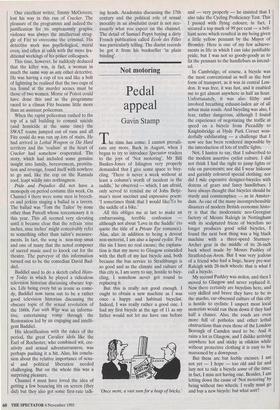Television
Happy ever after
Ian Hislop
Pride and Prejudice (BBC 1) concluded with a double wedding. Cracker (ITV) ended with a double death. The Bennet sisters married the men of their desires and the policeman rapist jumped off a hotel roof taking the prostitute murderer with him. So, both happy endings then.
Interestingly, the dramatic denouement of Pride and Prejudice was much more sat- isfying than that of Cracker. Although the period piece was initially disparaged in contrast to the gritty, realism of the mod- ern story, it remained consistent to its own world and its own obsessions. Pride and Prejudice begins with an observation about marriage, charts its characters' progress towards marriage, puts in the odd mar- riage along the way and then ends with a couple of simultaneous marriages. There is only one twist — the couple who appear to hate each other then fall in love — but since this is the oldest twist in English literature let alone television it is not terribly surprising. But it does not mat- ter in the slightest. The analysis of the romantic ideal of marriage confronted by enormous social and financial pressures is quite sufficient for a gripping story. The result is optimistic certainly but still 'realis- tic' in its own terms. Two excellent writers, Jane Austen and Andrew Davies, should take the credit for this. One excellent writer, Jimmy McGovern, lost his way in this run of Cracker. The pleasure of the programme and indeed the justification for its unpleasantly graphic violence was always the intellectual strug- gle of Fitz to overcome the criminal. His detective work was psychological, moral even, and often at odds with the more tra- ditional workings of his police colleagues.
This time, however, he suddenly deduced that the killer was, in fact, a woman in much the same way as any other detective. He was having a cup of tea and like a bolt of lightning he realised that the two cups of tea found at the murder scenes must be those of two women. Morse or Poirot could have done this and as the programme raced to a climax Fitz became little more than an assistant policeman.
When the rapist policeman rushed to the top of a tall building to commit suicide (and homicide at the same time) the SWAT teams jumped out of vans and all Fitz could do was run up lots of stairs. He had arrived in Lethal Weapon or Die Hard territory and the 'realism' at the heart of Cracker had somehow evaporated. The story, which had included some genuine insight into family, bereavement, prostitu- tion and revenge, found itself with nowhere to go and, like the cop on the Ramada roof, leapt wildly into nothingness.
Pride and Prejudice did not have a monopoly on period costume this week. On Channel 4 there were some men in breech- es and jerkins singing a ballad in a tavern. The ballad was 'Tom the Tailor' by none other than Purcell whose tercentenary it is this year. This all seemed very elevating until it became clear that the refrain 'nine inches, nine inches' might conceivably refer to something other than tailor's measure- ments. In fact, the song is non-stop smut and one of many that the noted composer of sacred music used to knock out for the theatre. The purveyor of this information turned out to be the comedian David Bad- diel.
Baddiel used to do a sketch called Histo- ry Today in which he played a ridiculous television historian discussing obscure top- ics. Life being every bit as ironic as come- dy, Baddiel now turns out to be a rather good television historian discussing the obscure topic of the sexual revolution of the 1660s. Fun with Wigs was an informa- tive, entertaining romp through the Restoration led by an engaging and intelli- gent Baddiel.
His identification with the rakes of the period, the great Cavalier idols like the Earl of Rochester, who combined wit, cre- ativity and sexual adventurousness, was perhaps pushing it a bit. Also, his conclu- sion about the relative importance of sexu- al and political liberation needed challenging. But on the whole this was a surprising pleasure.
Channel 4 must have loved the idea of getting a few bouncing tits on screen (they did) but they also got some first-rate talk- ing heads. Academics discussing the 17th century and the political role of sexual morality in an absolutist court is not nec- essarily what you expect on the channel. The detail of Samuel Pepys buying a dirty French publication called Ecole des Filles was particularly telling. The diarist records he got it from his bookseller 'in plain binding'.











































































 Previous page
Previous page